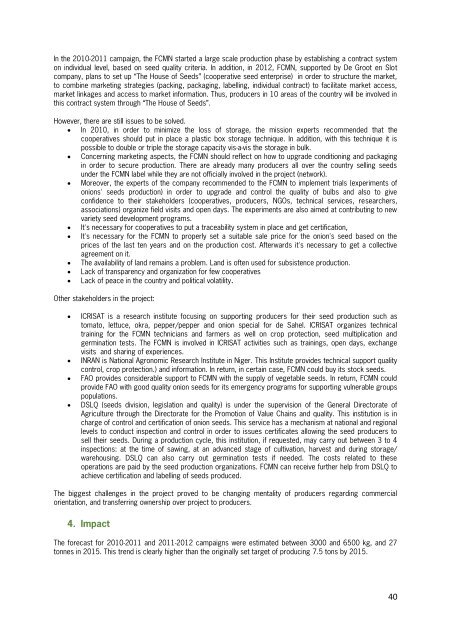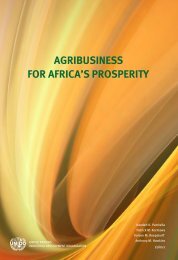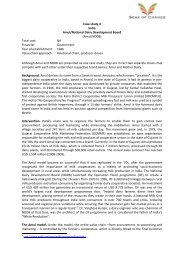Collection of Case Studies 2. - Seas of Change Initiative
Collection of Case Studies 2. - Seas of Change Initiative
Collection of Case Studies 2. - Seas of Change Initiative
Create successful ePaper yourself
Turn your PDF publications into a flip-book with our unique Google optimized e-Paper software.
In the 2010-2011 campaign, the FCMN started a large scale production phase by establishing a contract systemon individual level, based on seed quality criteria. In addition, in 2012, FCMN, supported by De Groot en Slotcompany, plans to set up “The House <strong>of</strong> Seeds” (cooperative seed enterprise) in order to structure the market,to combine marketing strategies (packing, packaging, labelling, individual contract) to facilitate market access,market linkages and access to market information. Thus, producers in 10 areas <strong>of</strong> the country will be involved inthis contract system through “The House <strong>of</strong> Seeds”.However, there are still issues to be solved. In 2010, in order to minimize the loss <strong>of</strong> storage, the mission experts recommended that thecooperatives should put in place a plastic box storage technique. In addition, with this technique it ispossible to double or triple the storage capacity vis-a-vis the storage in bulk. Concerning marketing aspects, the FCMN should reflect on how to upgrade conditioning and packagingin order to secure production. There are already many producers all over the country selling seedsunder the FCMN label while they are not <strong>of</strong>ficially involved in the project (network). Moreover, the experts <strong>of</strong> the company recommended to the FCMN to implement trials (experiments <strong>of</strong>onions' seeds production) in order to upgrade and control the quality <strong>of</strong> bulbs and also to giveconfidence to their stakeholders (cooperatives, producers, NGOs, technical services, researchers,associations) organize field visits and open days. The experiments are also aimed at contributing to newvariety seed development programs. It's necessary for cooperatives to put a traceability system in place and get certification, It's necessary for the FCMN to properly set a suitable sale price for the onion's seed based on theprices <strong>of</strong> the last ten years and on the production cost. Afterwards it's necessary to get a collectiveagreement on it. The availability <strong>of</strong> land remains a problem. Land is <strong>of</strong>ten used for subsistence production. Lack <strong>of</strong> transparency and organization for few cooperatives Lack <strong>of</strong> peace in the country and political volatility.Other stakeholders in the project:ICRISAT is a research institute focusing on supporting producers for their seed production such astomato, lettuce, okra, pepper/pepper and onion special for de Sahel. ICRISAT organizes technicaltraining for the FCMN technicians and farmers as well on crop protection, seed multiplication andgermination tests. The FCMN is involved in ICRISAT activities such as trainings, open days, exchangevisits and sharing <strong>of</strong> experiences.INRAN is National Agronomic Research Institute in Niger. This Institute provides technical support qualitycontrol, crop protection.) and information. In return, in certain case, FCMN could buy its stock seeds.FAO provides considerable support to FCMN with the supply <strong>of</strong> vegetable seeds. In return, FCMN couldprovide FAO with good quality onion seeds for its emergency programs for supporting vulnerable groupspopulations.DSLQ (seeds division, legislation and quality) is under the supervision <strong>of</strong> the General Directorate <strong>of</strong>Agriculture through the Directorate for the Promotion <strong>of</strong> Value Chains and quality. This institution is incharge <strong>of</strong> control and certification <strong>of</strong> onion seeds. This service has a mechanism at national and regionallevels to conduct inspection and control in order to issues certificates allowing the seed producers tosell their seeds. During a production cycle, this institution, if requested, may carry out between 3 to 4inspections: at the time <strong>of</strong> sawing, at an advanced stage <strong>of</strong> cultivation, harvest and during storage/warehousing. DSLQ can also carry out germination tests if needed. The costs related to theseoperations are paid by the seed production organizations. FCMN can receive further help from DSLQ toachieve certification and labelling <strong>of</strong> seeds produced.The biggest challenges in the project proved to be changing mentality <strong>of</strong> producers regarding commercialorientation, and transferring ownership over project to producers.4. ImpactThe forecast for 2010-2011 and 2011-2012 campaigns were estimated between 3000 and 6500 kg, and 27tonnes in 2015. This trend is clearly higher than the originally set target <strong>of</strong> producing 7.5 tons by 2015.40







